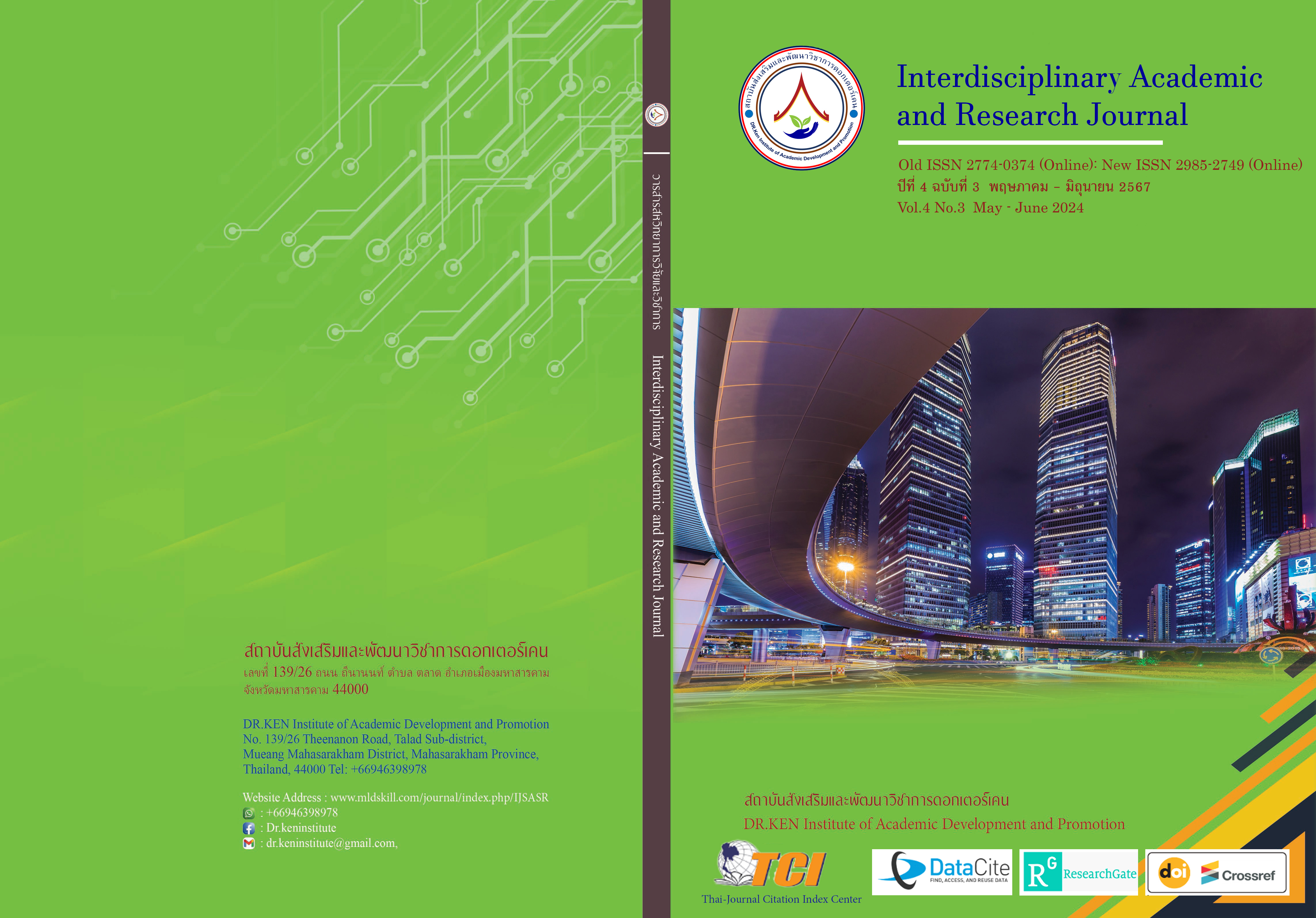Legal Issues Regarding the Cooking Control of Ready-To-Eat Foods
DOI:
https://doi.org/10.60027/iarj.2024.275931Keywords:
Preparer; , Ready-To-Eat FoodsAbstract
Background and Aims: Consumption patterns have changed in recent years to reflect a greater concern for health, particularly concerning food and the components of food that are consumed. On the other hand, according to Ministry of Public Health Announcement No. 237 B.E. 2001, Section 6, the goal is to safeguard public health from unhygienic food and to lower the risk of food-related illnesses. Thus, this research has the following objectives: 1) to study the concept Theories about controlling the preparation of ready-to-consume food. 2) To study legal measures regarding the preparation of ready-to-consume food in foreign countries and Thailand. 3) To study and analyze legal problems regarding the control of cooking. Ready-to-eat ready-to-eat food. 4) To study solutions to problems related to controlling the cooking of ready-to-eat ready-to-eat food.
Methodology: This research is qualitative. Using research methods from documents Collect data from theses, dissertations, articles, books, textbooks, and other academic documents. Including relevant domestic and international information. as well as comparative studies of related foreign laws It was analyzed and compared with Thai legal principles to find the appropriate way to solve the problem of controlling the production of ready-to-eat ready-to-eat food for maximum efficiency.
Results: 1) Protecting the rights of consumers and defining the responsibilities of cooks are important for laws governing the preparation of ready-to-eat ready-to-eat food. 2) Thailand's law on labeling of ready-to-cook foods. and ready-to-eat food ready for immediate consumption There is still no resolution in enacting laws to cover consumers of ready-to-consume ready-to-consume food. 3) According to the announcement of the Ministry of Public Health, conditions do not apply to ready-to-consume ready-to-consume food. which the cook sells directly to consumers is not subject to the Thai Food Act. The law that comes in to control food quality is an exception that creates legal gaps that affect people in society at large. 4) Laws should be added by amending the Food Act B.E. 2522 and amending ministry announcements. Public Health No. 237 B.E. 2001 as follows: (1) Definition of the word "cooker" (2) Requesting a license to establish a food establishment (3) Food labels for ready-to-eat ready-to-consume food (4) Powers and duties of Food and Drug Administration. Able to solve the problem of controlling the production of ready-to-eat ready-to-eat food for maximum efficiency. It is beneficial to control ready-to-eat food that is ready for immediate consumption by the people.
Conclusion: Modifying current laws and ministry announcements is essential because there is no comprehensive legislation governing the production and labeling of ready-to-consume foods. This is demonstrated by the fact that direct-to-consumer sales are exempt from current regulations. In the end, improving consumer protection and ensuring effective control over the production of ready-to-eat food would benefit public health and safety. This could be achieved by strengthening definitions, licensing requirements, labeling standards, and regulatory oversight under the Food Act B.E. 2522 and Ministry of Public Health No. 237 B.E. 2001.
References
จักรพันธ์ เพชรภูมิ. (2560). พฤติกรรมสุขภาพ: แนวคิด ทฤษฎี และการประยุกต์ใช้. พิษณุโลก: มหาวิทยาลัยนเรศวร.
ณัฏฐ์ระพี วงศ์ชนเดช. (2562). ปัญหาทางกฎหมายด้านการควบคุมระบบคุณภาพและความปลอดภัยอาหาร. วิทยานิพนธ์นิติศาสตรมหาบัณฑิต สถาบันบัณฑิตพัฒนบริหารศาสตร์.
ธีรวีร์ วราธรไพบูลย์. (2557). พฤติกรรมการบริโภค: อาหารนิยมบริโภคกับอาหารเพื่อสุขภาพ. วารสารปัญญาภิวัฒน์, 5 (2), 255-264.
ธีรวุฒิ ทองทับ. (2553). มาตรการทางกฎหมายในการคุ้มครองผู้บริโภคด้านการโฆษณา: ศึกษาเฉพาะกรณีการโฆษณาเครื่องดื่มแอลกอฮอล์. วิทยานิพนธ์หลักสูตรนิติศาสตรมหาบัณฑิต สาขานิติศาสตร์ มหาวิทยาลัยธุรกิจบัณฑิตย์.
มาลี จิรวงศ์ศรี. (2561). มาตรฐานและกฎหมายเกี่ยวกับอาหาร. Retrieved from: https://www3.rdi. ku.ac.th/wp-contents/uploads/A2.pdf.
รัษวรรษ อภิลักขิตกาล. (2561). มาตรฐานและกฎหมายอาหาร. พิมพ์ครั้งที่ 2. กรุงเทพฯ: สำนักพิมพ์มหาวิทยาลัยรามคำแหง.
สำนักงานคณะกรรมการอาหารและยา. (2560). สถานการณ์ความปลอดภัยด้านอาหารและผลิตภัณฑ์สุขภาพ ณ สถานที่จำหน่าย (กรุงเทพมหานคร). กรุงเทพฯ: หน่วยเคลื่อนที่เพื่อความปลอดภัยด้านอาหาร.
สุษม ศุภนิตย์. (2551). คำอธิบายกฎหมายคุ้มครองผู้บริโภค. พิมพ์ครั้งที่ 6. กรุงเทพฯ: สำนักพิมพ์แห่งจุฬาลงกรณ์มหาวิทยาลัย.
Johnson, A., & Brown, C. (2020). Enhancing the Safety of Ready-to-Eat Foods: Challenges and Opportunities. Food Control, 112, 107127. https://doi.org/10.1016/j.foodcont.2020.107127
Lee, J., & Kim, S. (2021). Application of Sous-Vide Cooking for Enhancing the Microbiological Safety of Ready-To-Eat Foods. Food Science and Technology Research, 27(3), 375–382. https://doi.org/10.3136/fstr.2021-0006
Smith, T.J., Jones, R., & Patel, A. (2019). Cooking Control as a Critical Step in Ensuring the Microbiological Safety of Ready-to-Eat Foods. Journal of Food Protection, 82(9), 1593–1605. https://doi.org/10.4315/0362-028x.jfp-19-032
Downloads
Published
How to Cite
Issue
Section
License
Copyright (c) 2024 Interdisciplinary Academic and Research Journal

This work is licensed under a Creative Commons Attribution-NonCommercial-NoDerivatives 4.0 International License.
Copyright on any article in the Interdisciplinary Academic and Research Journal is retained by the author(s) under the under the Creative Commons Attribution-NonCommercial-NoDerivatives 4.0 International License. Permission to use text, content, images, etc. of publication. Any user to read, download, copy, distribute, print, search, or link to the full texts of articles, crawl them for indexing, pass them as data to software, or use them for any other lawful purpose. But do not use it for commercial use or with the intent to benefit any business.
















.png)


